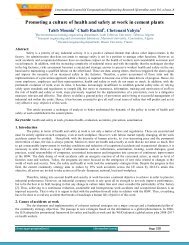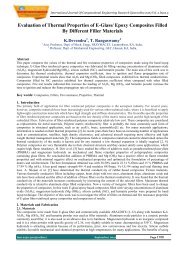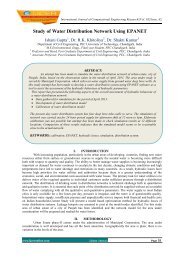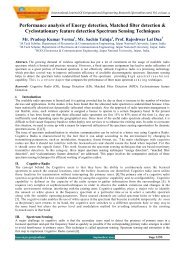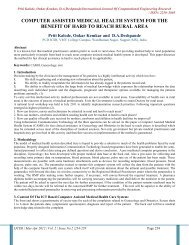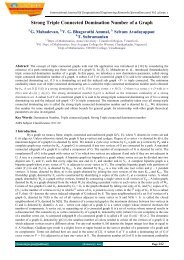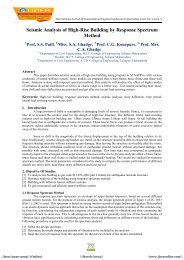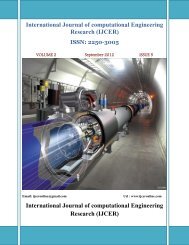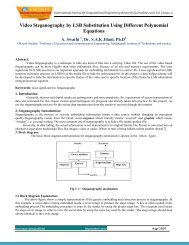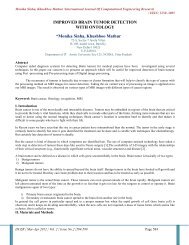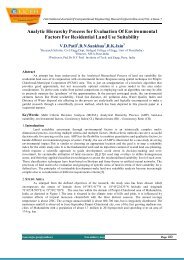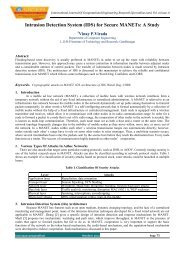ISSN: 2250-3005 - ijcer
ISSN: 2250-3005 - ijcer
ISSN: 2250-3005 - ijcer
You also want an ePaper? Increase the reach of your titles
YUMPU automatically turns print PDFs into web optimized ePapers that Google loves.
International Journal Of Computational Engineering Research (<strong>ijcer</strong>online.com) Vol. 2 Issue. 8Study of Genetic Algorithm for Process Scheduling inDistributed SystemsUsha Barad1,PG Student of Computer Engineering, Merchant Engineering College, Gujarat, IndiaAbstract : This paper presents and evaluates a new method for process scheduling in distributed systems. Theproblem of process scheduling in distributed system is one of the important and challenging area of research incomputer engineering. Scheduling in distributed operating system has an important role in overall system performance.Process scheduling in distributed system can be defined as allocating processes to processor so that total execution timewill be minimized, utilization of processors will be maximized and load balancing will be maximized. Geneticalgorithm is one of the widely used techniques for constrain optimization. The scheduling in distributed systems isknown as an NP-complete problem even in the best conditions, and methods based on heuristic search have beenproposed to obtain optimal and suboptimal solutions. In this, paper using the power of genetic algorithms. We solvethis problem considering load balancing efficiently. We evaluate the performance and efficiency of the proposedalgorithm using simulation result.Keyword: Distributed system, scheduling, Genetic algorithm, load balancingI. IntroductionScheduling in distributed operating systems is a critical factor in overall system efficiency. A DistributedComputing system (DCS) is comprised of a set of Computers (Processors) connected to each other by communicationnetworks. Process scheduling in a distributed operating system can be stated as allocating processes to processors sothat total execution time will be minimized, utilization of processors will be maximized, and load balancing will bemaximized. The computational complicated process cannot be executed on the computing machine in an acceptedinterval time. Therefore, they must be divided into small sub-process. Process scheduling in distributed system is donein two phases: in first phase processes are distributed on computers and in second processes execution order on eachprocessor must be determined [1]. Several methods have been proposed to solve scheduling problem in DCS. Themethods used to solve scheduling problem in distributed computing system can be classified into three categories graphtheory based approaches , mathematical models based methods and heuristic techniques [1]. Heuristic algorithmcan be classified into three categories iterative improvement algorithms [2], the probabilistic optimization algorithmsand constructive heuristics. Heuristic can obtain sub optimal solution in ordinary situations and optimal solution inparticulars. The first phase of process scheduling in a distributed system is process distribution on computer. Thecritical aspects of this phase are load balancing. Recently created processes may be overloaded heavily while the othersare under loaded or idle. The main objectives of load balancing are to speared load on processors equally, maximizingprocessors utilization and minimizing total execution time [4]. The second phase of process scheduling in distributedcomputing system is process execution ordering on each processor. Genetic algorithm used for this phase. Geneticalgorithm is guided random search method which mimics the principles of evolution and natural genetics . Geneticalgorithms search optimal solution from entire solution space. In dynamic load balancing, processes must bedynamically allocated to processors in arrival time and obtain a near optimal schedule, therefore the execution of thedynamic load balancing algorithm should not take long to arrive at a decision to make rapid task assignments.A GA starts with a generation of individuals, which are encoded as strings known as chromosomes. Achromosome corresponds to a solution to the problem. A certain fitness function is used to evaluate the fitness of eachindividual. Good individuals survive after selection according to the fitness of individuals. Then the survivedindividuals reproduce offspring through crossover and mutation operators. GA-based algorithms have emerged aspowerful tools to solve NP-complete constrained optimization problems, such as traveling salesman problem, job -shopscheduling and flow-shop scheduling, machine learning, VLSI technology, genetic synthesis and etc.In this paper usingthe power of genetic algorithms we solve this problem considering load balancing efficiently. The proposed algorithmmaps each schedule with a chromosome that shows the execution order of all existing processes on processors. Thefittest chromosomes are selected to reproduce offspring; chromosomes which their corresponding schedules have lesstotal execution time, better load-balance and processor utilization. We assume that the distributed system is nonuniformand non-preemptive, that is, the processors may be different, and a processor completes current process beforeexecuting a new one. The load-balancing mechanis m used in this paper only schedule processes without processmigration and is centralized.||Issn <strong>2250</strong>-<strong>3005</strong>(online)|| ||December|| 2012 Page 269



